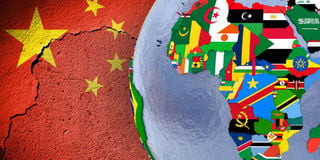Africa's Response to China's Expanding Influence

What you need to know:
Critics online have voiced doubts, suggesting that Beijing's efforts to embed its values into Africa's cultural and ideological landscape are easier said than done. To further its influence, the Chinese Communist Party (CCP) is establishing political schools across Africa.
The Chinese Communist Party (CCP) has significantly expanded its influence across Africa through strategic infiltration of political schools and the implementation of satellite TV in ten thousand schools. This comprehensive approach aims to shape political ideologies and cultural perceptions, aligning them with CCP values.
By embedding itself in educational institutions, the CCP not only fosters a pro-China sentiment but also cultivates future African leaders who are sympathetic to its policies. The satellite TV initiative further amplifies this influence by providing access to Chinese media content, thereby promoting Chinese culture and perspectives.
This dual strategy of educational and media penetration underscores the CCP's long-term vision of establishing a robust presence in Africa, ultimately enhancing its geopolitical clout on the continent.
The Chinese Communist Party (CCP) is advancing a broad infiltration strategy in Africa, masked as development aid to bolster its global influence and spread its propaganda.
This effort involves substantial investments in education and infrastructure across the continent, including the installation of satellite TV in nearly 10,000 villages and the establishment of political schools. So far, over 9,600 villages in 23 African countries have been equipped with satellite TV, significantly altering local engagement with the global community.
Chinese dramas and movies have woven themselves into the fabric of daily life, with some viewers claiming they can't end the day without catching up on their favorite shows. Yet, locals often find the subscription fees to be a significant financial burden. According to BBC reports, the Chinese Communist Party (CCP) funds this initiative, which is managed by Star Times, a Chinese private company responsible for both infrastructure development and channel management.
Through Star Times, the CCP extends its influence across Africa via broadcast content, while Star Times benefits financially by charging subscription fees.
The content line-up is dominated by Chinese TV dramas, Kung Fu films, and news from the Chinese Communist Party's (CCP) English-language channel, CGTN. A local girl told the BBC she began watching Star Times four years ago, enjoying a six-month free trial before having to pay for a subscription. Those who don't subscribe are limited to a handful of free channels. An African village chief described the costs as quite high, noting that many locals struggle to afford them.
The cheapest package runs around $22.96 per month. A scholar researching Star Times' impact on Africa pointed out to the BBC that, due to these subscription fees, the project hasn't achieved the CCP's goal of regularly engaging viewers with Chinese content. Despite new satellite dishes popping up on rooftops, he noted that local perceptions of China haven't necessarily shifted.
Critics online have voiced doubts, suggesting that Beijing's efforts to embed its values into Africa's cultural and ideological landscape are easier said than done. To further its influence, the Chinese Communist Party (CCP) is establishing political schools across Africa.
In May, the CCP and Kenya agreed to set up a Cadre School in Nairobi, the capital. Previously, the CCP invested $40 million to open the Mamu Julius Nyerere Leadership School in Kibaha, Tanzania, named after the nation's founding father, which became operational in 2022. Kenyan professor and African international relations expert Chacha Nganati told Voice of America that the CCP's extensive investment in education and infrastructure has had a profound impact on Africa.
He observed that China is vying for global influence, positioning itself as a world power, and gradually displacing and undermining US interests on the continent. To support its infrastructure expansion, the CCP has significantly increased loans to African nations in recent years. A study by Boston University reveals that from 2000 to 2023, the CCP extended $182.28 billion in loans to Africa.
However, Professor Naigati pointed out that debt traps have weakened the benefits Africa gains from Chinese investment. Chinese loans are very expensive, and the cost of some projects supported by China on the African continent exceeds what African countries might pay if they used other financing channels.
Despite China's extensive efforts to expand its influence in Africa through satellite TV and political school infiltration, it faces significant challenges in winning over the continent. The Chinese Communist Party (CCP) has invested heavily in these initiatives, aiming to shape political ideologies and cultural perceptions in its favour. However, the reception has been mixed. Many African nations are wary of China's intentions, viewing its actions as a form of neo-colonialism rather than genuine partnership. This skepticism is fuelled by concerns over debt dependency, loss of sovereignty, and the potential erosion of local cultures and values.
Moreover, the effectiveness of satellite TV in promoting Chinese culture and perspectives is limited by the diverse media landscape in Africa. Local and international media outlets continue to dominate, making it difficult for Chinese content to gain a foothold. Additionally, the infiltration of political schools has not yielded the desired results, as many African leaders and intellectuals remain committed to their own political ideologies and resist external influence.
In summary, while China's efforts to woo Africa are ambitious and well-funded, they are met with resistance and skepticism. The continent's diverse political landscape and strong sense of sovereignty pose significant barriers to China's goal of integrating Africa into its political fold.



